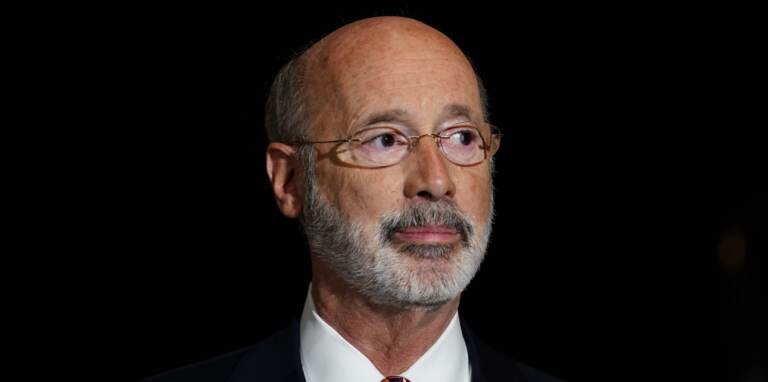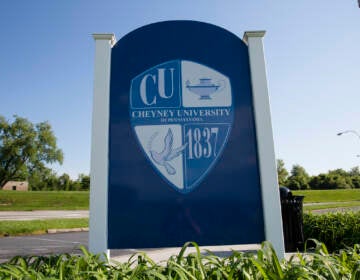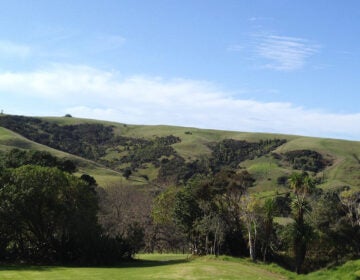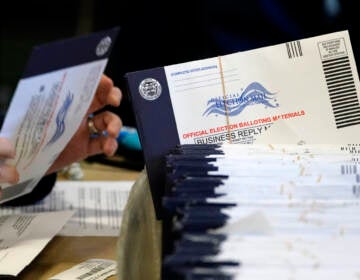Pa. judge halts Gov. Wolf’s bridge tolling plans, for now
PennDOT could appeal the preliminary injunction to the state Supreme Court.

File photo: Pennsylvania Gov. Tom Wolf speaks during a rally at Sharon Baptist Church, Friday, July 9, 2021, in Philadelphia. (Matt Slocum/AP Photo)
A judge has ordered a temporary halt to Gov. Tom Wolf’s plan to toll as many as nine major bridges on interstates in Pennsylvania, siding Wednesday with Cumberland County and a handful of municipalities that are challenging the process as both illegal and unconstitutional.
Commonwealth Court Judge Ellen Ceisler ordered the halt, saying the state Department of Transportation must stop all studies, right-of-way acquisitions, construction or work under any contracts, and put off any planned hearings, meetings or spending.
Wolf’s push for tolling comes as states increasingly look to user fees to make up for declining gas tax revenue that is not keeping up with the demands of fixing highways and bridges. However, it has spurred opposition from some communities and Republican lawmakers, who say it will be costly to locals and businesses and create congestion.
It also comes amid rising gas prices. Wolf himself only has eight months left in office, and neither of his potential successors in November’s election support it.
Republican state Sen. Doug Mastriano, who won the GOP’s nomination in Tuesday’s primary contest to run for governor, has backed legislation to effectively put a stop to the plan.
Democratic nominee Josh Shapiro also opposes it, his campaign said, pointing to his comments last week to the Courier-Express newspaper that he would look to other state and federal dollars to put toward the bridges.
The lawsuit was filed in March by Cumberland County and seven municipalities.
PennDOT could appeal the preliminary injunction to the state Supreme Court. A PennDOT spokesperson would only say Wednesday that the agency was reviewing the decision, giving no response to questions about what work was ongoing that must stop and how the decision will affect the timeline in carrying out the tolling projects.
PennDOT last year named nine bridges on six interstates that it said needed upgrades and that it will consider for tolling to help generate the cash. The concept was approved in 2020 by the Public-Private Transportation Partnership board, the first time it had approved a plan involving user fees, and requires no legislative approval.
In the lawsuit, lawyers for Cumberland County and the seven municipalities argued both that the process followed by PennDOT and the Public-Private Transportation Partnership Board violated the 2012 law that created the board.
In part, they said that residents of the county and municipalities had not had a legitimate opportunity to express their views on one of the bridges that might be tolled — I-83′s South Bridge across the Susquehanna River between Cumberland and Dauphin counties — before the board gave PennDOT permission to pursue it.
The lawyers also argued that the law itself violated constitutional prohibitions against the Legislature delegating its taxation authority, in this case to the board.
In her decision, Ceisler wrote that the 2012 law contained no limits that courts usually look for in cases where the Legislature has delegated its authority.
In addition, the scale of the plan and how the board approved it “greatly heightens the court’s delegation concerns,” Ceisler wrote. “The board essentially approved a massive multi-billion dollar infrastructure initiative on an admittedly meager record, consisting of a 4-page recommendation from DOT, a presentation, and minimal discussion, and without understanding which, or how many, pieces of public infrastructure the initiative would affect.”
The other bridges under consideration for tolling are I-78′s Lenhartsville Bridge in Berks County; I-79′s bridges over State Route 50 in Allegheny County; I-80′s bridges across Canoe Creek in Clarion County, Nescopeck Creek in Luzerne County, North Fork in Jefferson County and the Lehigh River, near Wilkes-Barre; I-81 over the Susquehanna River in northern Pennsylvania; and Girard Point Bridge in Philadelphia.
WHYY is your source for fact-based, in-depth journalism and information. As a nonprofit organization, we rely on financial support from readers like you. Please give today.







